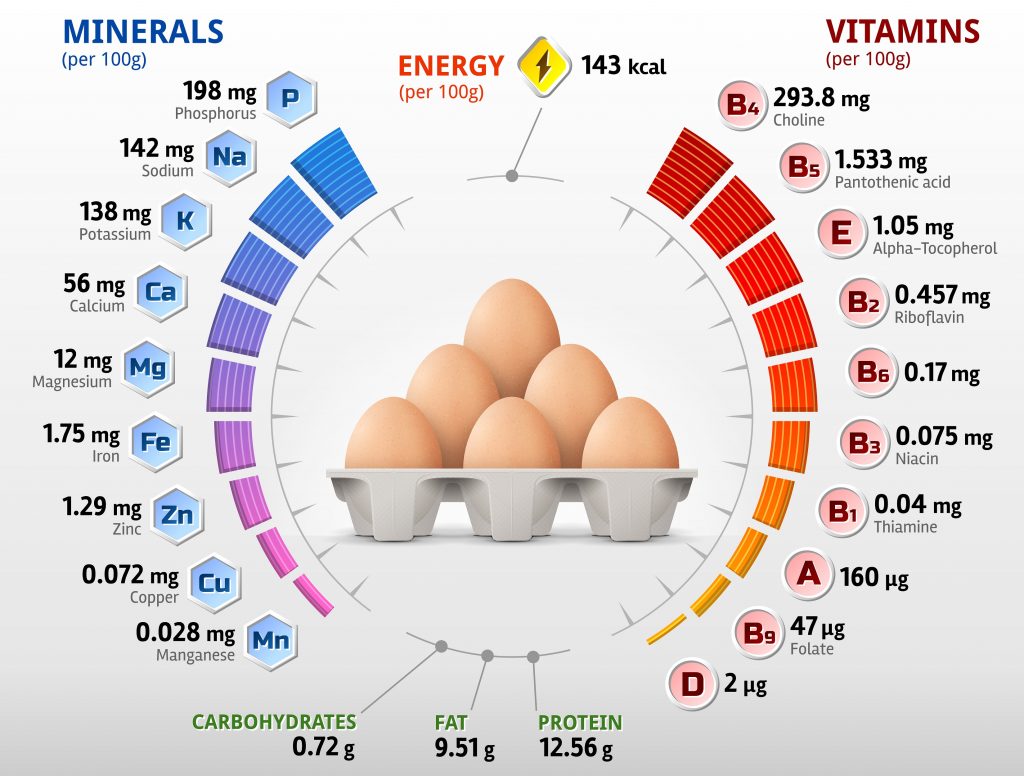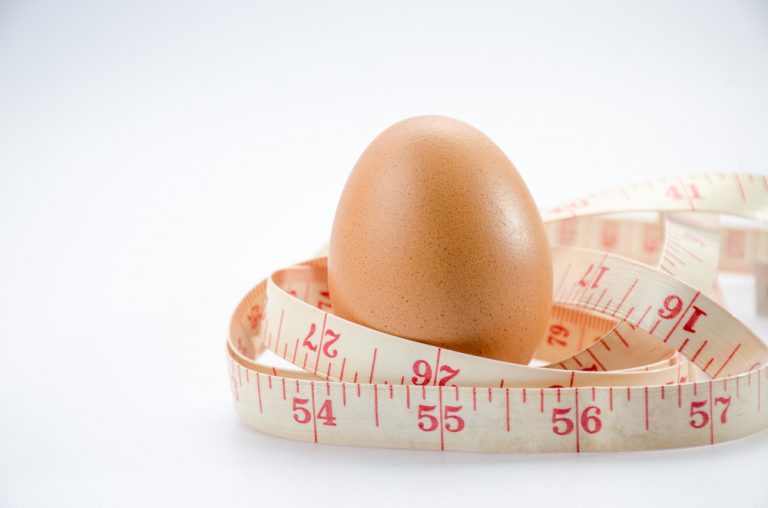An egg is an excellent source of complete and easily assimilable protein. It contains all the essential amino acids, which our body can not produce by itself and therefore they must be provided with diet sources. Egg protein is considered to be a reference protein, i.e. a reference for determining the nutritional value of proteins from other foods.
How many calories does an egg have?
An average egg provides 75 kcal, 6.3 g protein, 5.3 g fat and 0.6 g carbohydrates.
- egg white provides 49 kcal per 100 g, consists of nearly 88% water, 11% protein and 1% carbohydrate
- egg yolk provides 314 kcal per 100 g, consists of 28% fat and 16% protein
Healthy substances contained in eggs
Eggs provide large amounts of fat-soluble vitamins - A, D, E and K, as well as B vitamins. They contain a lot of phosphorus, potassium, sodium, calcium, iron and magnesium. Since the 1970s it has been strongly recommended to limit egg consumption to 3-4 eggs per week because of the high cholesterol content of the yolk and the possibility of increasing the risk of atherosclerosis and other cardiovascular diseases.
Currently, the World Health Organization has made a recommendation on how many eggs a healthy person can eat per week, establishing that we should not exceed 10 eggs. Today much more is known about the relationship between eggs and cholesterol level.
It turns out that dietary cholesterol does not have such a negative effect on cardiovascular health as was thought until recently. Saturated fatty acids and trans fats are much more dangerous for increasing the risk of atherosclerosis. In addition, eggs contain lecithin, which emulsifies fat and cholesterol molecules from food and reduces the risk of atherosclerotic plaque formation. Lutein is responsible for the health of the eyes, protects them from harmful UVA and UVB radiation and prevents damage to the retinal capillaries.

Egg diet - rules
Nutritionists and doctors at the Mayo Clinic, which treats obesity, have developed a weight loss program that is based on eggs. The egg diet should last for 2 weeks. During this time you can lose up to 10 kilograms.
During the day you should eat 3 meals, and in each of them, there should be eggs. You should eat 6 hard-boiled eggs every day. Remember that they should not be cooked longer than 10 minutes because the protein becomes less digestible if treated longer. Meals can be supplemented with vegetables in unlimited quantities and up to two portions of fruits per day. Vegetables and fruits provide fibre as well as a large number of vitamins and minerals.
During the second week of the egg diet, you can replace the egg dinner with a portion of lean fish or white meat. Every day you need to drink about 3 litres of fluids in the form of water and herbal or fruit teas. We want to drink much to hydrate the body and remove harmful nitrogen compounds produced as a result of protein digestion. The diet should avoid bread and other sources of carbohydrates like potatoes, sweets, alcohol, and sugar.
The effectiveness of the egg diet is based on the low calorie and high protein content of eggs. Protein gives a feeling of satiety for a long time and causes an increase in diet-induced thermogenesis. To digest protein, the body uses a relatively lot of energy, so weight loss is more effective.
Is the egg diet healthy? Does it help to lose weight?
Egg diet can be used by most people in good general health. It should not be used by children and adolescents, pregnant and breastfeeding women and physical workers. It is also not recommended for people with liver disease due to a large amount of fat in eggs, as well as for people with cardiovascular disease. Their recommended dose of eggs per week should not exceed 4.
Egg diet allows you to lose weight quickly and is easy to prepare, however, it has many more disadvantages than advantages
- it is very restrictive
- is deficient in calories and nutrients
- contains virtually no carbohydrates, which are the body's primary source of energy
- may contribute to a dysregulated metabolism
- yo-yo effect may occur
- is monotonous and difficult to stick to in the long run






